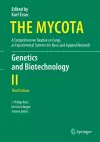
Genetics and Biotechnology
2 contributors - Hardback
£123.00
J. Philipp Benz (born 1977) studied biology at the TU Braunschweig (2003). The research work for his thesis was done in the laboratory of Nigel Crawford at UC San Diego (CA, USA). He subsequently performed his dissertation at the LMU Munich, working in the research group of Jürgen Soll (Department of Biochemistry and Physiology of Plants) (2009). He then returned to the USA to become a postdoctoral fellow in the laboratory of Chris Somerville at the Energy Biosciences Institute (UC Berkeley, CA, USA) where he started to work on filamentous fungi. In 2014, he was appointed assistant professor for Wood Bioprocesses at the Technical University of Munich (TUM School of Life Sciences Weihenstephan, Holzforschung München). His research group is studying the processes used by filamentous fungi to degrade lignocellulosic biomass. Central questions are how fungi perceive the composition of the plant biomass on a molecular level and how they adapt their metabolism to effectively degrade the substrate.
Kerstin Schipper (born 1980) completed her studies in biology at Osnabrück University in 2005. For the research work of her Master thesis she moved to the laboratory of Heinrich Jung at LMU Munich. She then performed her dissertation and a short post-doctoral time under the supervision of Regine Kahmann at the Max Planck Institute for Terrestrial Microbiology in Marburg in the field of plant-pathogen interactions. Since 2011 she is a group leader at the Institute for Microbiology at Heinrich Heine University Düsseldorf. Her work focusses on fungal biotechnology using the basidiomycete Ustilago maydis. Her major interest is a novel unconventional protein secretion pathway and its exploitation for production of heterologous proteins.